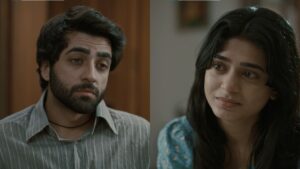
In a recent interview, Fahad Mustafa was quick to confirm that Kabhi Mein Kabhi Tum will not be getting a sequel. When asked about the possibility of a Mustafa-Sharjeena part two, he firmly replied, “There are no chances.”
Further elaborating in the interview, Fahad added, “I’m not that stupid. See, I didn’t do this project to mint money. Yes, I will make a lot of money from it now. But that was not why I did it, so what’s the point of a sequel?”
There is no doubt that audiences have loved the plot that Kabhi Mein Kabhi Tum brought to our screens. The raw nature of Mustafa and Sharjeena, paired with the way Fahad Mustafa and Hania Amir approached their characters, is a testament to both their acting prowess and the plot’s credibility. However, extending the story further doesn’t resonate with audiences. Here’s the truth: we love a happy ending with a well-fleshed-out plot that provides closure, let’s keep it that way.
Yet, time and again, we’ve seen popularity fall prey to the lure of profit, as cinema and entertainment, like any other business, often prioritizes revenue over creativity. In a parallel sentiment Lekha Menon aptly comments on the concept of franchises in her review of Bhool Bhulaiyaa 3 for Khaleej Times. She writes:
“Franchises in cinema are like fast-food chains: the original might have been a hit, but the spin-offs keep arriving with fewer nutrients and more filler. Creative storytelling? Common sense? Gone faster than a ghost! When a movie takes the franchise route, it’s the brand manager calling the shots, not a filmmaker, and the difference shows.”
The reluctance of superstars like Fahad Mustafa to jump on the sequel bandwagon is a refreshing reminder that storytelling still holds value for some creators. His firm stance against a sequel for Kabhi Mein Kabhi Tum, despite its immense popularity, demonstrates a commitment to creative integrity over commercial allure.
While there are exceptions, the creative degradation of many sequels highlights how commercial interests often overshadow the storytelling process. For audiences who value compelling narratives and meaningful closure, this decision is a win worth celebrating.









